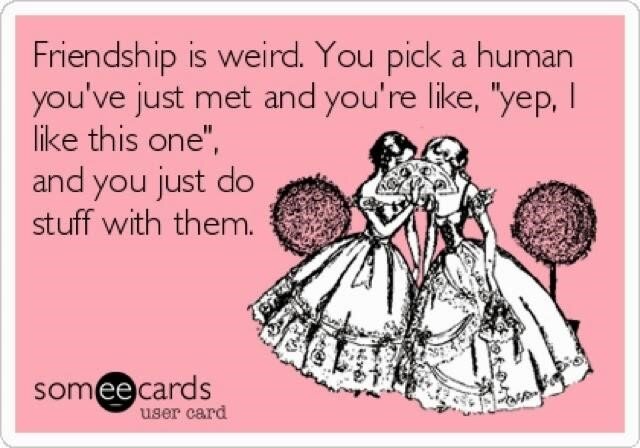On How To Make Friends (In COVID)
If you’ve ever found that making friends as an adult is hard, you’re not alone. You know who is alone… the 14% of people who live alone, and there is no question that isolation is a problem even without the complication of Covid. How can one make friends in this weird time?
Under normal circumstances, a precursor to friendship tends to be proximity. Perhaps you work together, find yourself in the same class, or live nearby. But what if you’re wondering how to make friends in a new city, or how to make friends in college if you’ve just started school?
In Covid times, there are a number of barriers to our usual ways of bonding. You can’t get near anyone, you can’t really see anyone’s faces or facial expressions with masks on, and many activities you used to do in person have gone virtual.
It’s tough on everyone. But perhaps a few groups are feeling the challenges more so than others, including the 4 million Canadians and 35.7 million Americans who live alone.
Maybe don’t try this
Making friends as an adult is hard at the best of times. People get busy with kids, jobs, caring for parents, taking care of the house, etc. Around 20% of Americans report always feeling lonely – and that number is growing. We are more physically disconnected than ever. Additionally, there is no question that the Covid-19 pandemic and social isolation practices that have come from it are having a negative impact on mental health. Not only that, we don’t know when the pandemic will be “over” or when we can return to normal activities, and there is a prevalent sense of lack of control.
Friendship and connection are important, but we are facing some real challenges making that happen these days. How can Behavioural Science help give us a chance to form some real bonds?
Well, I figure, we might as well use some biases and our natural human tendencies to our advantage and make some new friends. I’ve put together some tips on how to make friends, although I’ve written this post from the standpoint of how to make friends in COVID, these tips are equally applicable whether you’re wondering how to make friends in a new city, how to make friends in college, or even how to make friends online! Read on!
Why does it have to be so complicated?
Affinity Bias
Think about the contexts in which you have made friends – you went to camp together, you were in the same club at school, on the same sports team. We tend to like people who are like us, a concept also known as homophily, and is a part of the affinity bias.
The downside of affinity bias is that it can lead us to form non-diverse groups. However, affinity bias isn’t just about choosing to become closer to people who are like us in fundamentally unchangeable ways like race, gender, age, etc., but it can lead us to bond over shared experience, too. There is a good chance of a friendship sparking if you’ve experienced something together. For example, I have some great friends that I am really completely dissimilar to that I bonded with over shared experiences at work or university.
Covid’s silver lining is that we are all going through this situation together at the same time. The context has never been more uniting in that it’s the same for everyone. Also, there are all kinds of new ways to connect with people virtually: virtual cooking classes, virtual paint nights, virtual community groups, etc. Have a look at what’s out there.
Lesson:
Use Covid to ‘rethink’ the boundary of who you might have shared experience with. Use those commonalities to start a conversation and to bond. This tip is especially useful if you’re wondering how to make friends online!
Its a delicate balance
Status Quo Bias
We like things to stay the same. We feel considerable inertia to do nothing. And the most inertia-y of things is being at home a lot. Not only that, the present context is WORSE than what we had previously, so people are actively resisting changing and waiting for things to go back to normal.
But the bars are still closed and we still need friends, leaving many to wonder, how the heck to I make new friends online?
Building relationships, especially new ones, means getting after it, actually taking that first step. Recognize that your mind will likely say “nahhh, let’s just stay here on this comfy couch”. That’s not likely to result in making a new friend. Be proactive!
Lesson:
Be brave and reach out to a potential friend, even if it’s not what you would normally do. This one is especially applicable if you’re wondering how to make friends in college. Reach out to that person on your zoom call and ask to share notes about the class! You’d be surprised how easily you can guess people’s emails :)
I mean, yeah that’s kind of it
Conversation: Building Interpersonal Closeness
The literature has found that the forming of close relationships is driven by “sustained, escalating, reciprocal, personalistic self-disclosure”. Basically the usual get to know you stuff.
This suggests:
Building a rapport about shared interests
Asking your new friend get to know you questions (nothing too deep at first, but then moving to more personalized questions as the context will allow)
Reciprocating by sharing about yourself in return
Here are a couple questions you can ask to build up closeness and make those new friends.
Level 1: New friends
What was the best gift you ever received and why?
How did you celebrate last Halloween?
What is your favourite holiday? Why?
Level 2: More than acquaintances
What are the names and ages of your family? Aunts, uncles, siblings, grandparents, etc.
Do you like to get up early or stay up late? Is there anything funny that has resulted from this?
Where are all the places you’ve lived?
Level 3: Friendship Ninja
Where did you go to high school? What was your high school like?
What foreign country would you most like to visit? What attracts you to this place?
Have you ever had a really bad haircut experience? How often do you get your haircut? (Pre-covid and during covid)
Why do these work? They bond you with shared experiences, details from your past, vulnerability, humour, and shared human themes like family and coming of age. These ones are especially useful if you’re wondering how to make friends in a new city. Why not strike up a Level 1 conversation with someone in the elevator or while you’re waiting for a coffee at Starbucks?
It takes effort and getting a little uncomfortable
In Person Activities: Safety First
Let’s say you’ve made a new friend, or reconnected with an old one, and actually want to see each other in person (safely!). A walking date is a good place to start. Being in a public place is a good idea with a stranger, but being outside is great for Covid safety, and exercise is awesome, too!
Here are a couple other ideas (depending on the weather!):
Outdoor social distance picnic (following public health guidelines, of course!)
Go grocery shopping together
Head to the drive in
The need for connection is real
Virtual Activities: Be Creative
There are so many things to be done together virtually. Here are a few ideas:
Cook a meal together
Watch a movie at the same time
Have a conversation
Play a virtual game
Give each other a tour of your place (if you feel comfortable)
Craft at the same time (friendship bracelets, anyone?!?!)
Some Final Tips
Keep in touch. Spending time bonding and the ghosting is not cool. It suggests inauthenticity, like you didn’t want to be friends in the first place. Or it might feel like rejection. Either way, keep in touch.
Friendship is a balance. If your new friendship isn’t working out, that’s okay. Don’t put pressure on yourself to make everything work perfectly. People are different. Don’t be discouraged if you haven’t found your new best friend.
Don’t take it personally. Everyone needs connection, though how much connection will differ. Some people haven’t realized this yet and are just plain old sidetracked by their own status quo. Or own mental health, social anxiety, basically their own issues. I’m sure they’ll appreciate it if you tried.
Now get out there and find some new friends!
Love,









